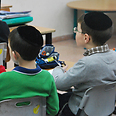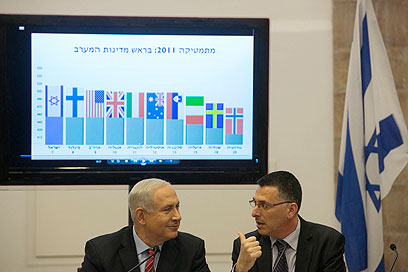
Professionals downplay Israel's ranking in int'l math tests
Israeli education professionals say dramatic bump in achievements of Israeli school kids in international tests may stem form exclusion of haredi, special education pupils
After international studies' findings point to an impressive rise in Israeli schoolchildren's achievements in math, science, and language skills, responses among education professionals vary.
Though many laud the accomplishments, others take it with a grain of salt, citing obvious omissions in the report – neither haredi pupils, Arab schoolchildren in east Jerusalem, nor special education students were included in the studies.
Related stories:
- Israel ranks 7th in international math tests
- Israeli students' performance in math, science slipping
- Knesset report: Education mainly for rich, Jews
The studies, Trends in International Mathematics and Science Study (TIMSS) and the Progress in International Reading Literacy Study (PIRLS) for 2011, omitted 22.6% of the population of Israeli students.
Following Israel in this regard is the United States, with an exclusion of 7.2% of the students. The remaining countries examined in the studies had fewer than 6% exclusion.

Prime Minister Benjamin Netanyahu and Education Minister Gideon Sa'ar taking pride in the studies' findings (Photo: Ohad Zwigenberg)
However, since the same populations were not calculated in previous years (in the studies conducted four years earlier, 22.8% were excluded), that parameter does not account for the sharp rise in the ranking of the Israeli students.
According to Dr. Yoram Harpaz of the Beit Berl College it is not impossible that schools have been preparing the children specifically for the TIMSS and PIRLS. "Such a dramatic improvement is impossible. Students were probably prepared specifically for the tests, which is why they did so well," Harpaz said.
Zipi Libman, Rector of the Kibbutzim College of Education also found the dramatic improvements hard to explain, specifically the Israeli students' impressive math scores (from 24th place in 2007 to seventh in 2011).
"I find it hard to believe that an entire country can climb so rapidly and exhibit results that are much better than those of Finland, the US and the UK, which are considered education empires," Libman noted.
Libman also added that despite the improvement in achievements, the differences amongst different Israeli populations should be addressed, as gaps were still evident between Arab and Jewish students and between students of different socioeconomic statuses.
"Inequality," she explained, "is always a bad thing, and in order to reduce the gaps, we must invest more in underprivileged populations."
The Education Ministry did not pay special attention to the exclusion of children attending haredi schools, schools in east Jerusalem, or those in the special education system. Rather they focused on the achievements as the result of hard work.
The sample was huge, reviewing thousands of students whose identity is not determined by the Education Ministry. The data are a testament to the ability of the school system to succeed," the ministry statement noted.
- Receive Ynetnews updates directly to your desktop










